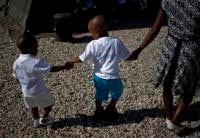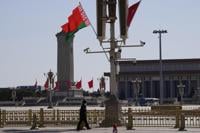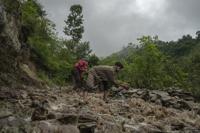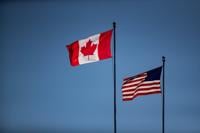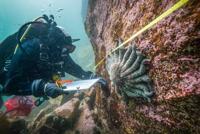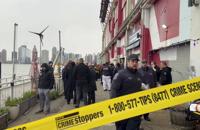SAN JUAN, Puerto Rico (AP) — At only 6 years old, Esai Reed has endured three emergency evacuations from orphanages across Haiti as gangs pillage and plunder their way through once peaceful communities.
He is now in northern Haiti under the care of a U.S. organization after the director of Esai’s last orphanage fled the troubled Caribbean country .
Nearly five months have passed since the last evacuation, and in that time, Esai, who loves soccer and is mischievous, hasn’t been able to talk to his adoptive mother in the U.S. or his two older brothers who live with her as internet connections and other logistics falter.
“Clearly, this is an emergency,” said Michelle Reed, a 51-year-old teacher and single mother who lives in Florida.
Reed's is one of 55 families from Tennessee to California asking the U.S. government for humanitarian parole for some 70 children they’re adopting. It was an opportunity the U.S. granted to more than a dozen other children earlier this year when gangs attacked key government infrastructure and forced Haiti’s main international airport , prompting evacuations of dozens of U.S. citizens and 39 children from March to May who had final adoption decrees.
Reed and other families said they were initially told they would be part of the evacuation group, but the U.S. government later said that “despite intensive efforts,” it had not found a solution to allow children without adoption decrees to leave Haiti and enter the U.S., according to a letter from the office of children’s issues at the State Department.
“We understand that this update will be disappointing for both you and your child(ren),” the office wrote.
Reed and other families warned that completing the adoption process in Haiti instead of in the U.S. as requested forces the children to travel to Port-au-Prince, which is largely under siege by gangs, to obtain a visa, passport and medical exam.
“Why aren’t they doing that for our kids?” asked Emmerson, who lives in the U.S. and requested that his last name be withheld for safety since he and his wife, who are adopting his niece and nephew, have family in Haiti.
Reed noted that the Haitian Central Adoption Authority has given the families permission for the children to leave the country and complete the adoption in the U.S.
But a State Department spokesperson told The Associated Press that other Haitian authorities overseeing the adoption process do not agree. It added that it’s working with the Haitian government “to move adoptions forward as quickly as possible” while ensuring that laws, regulations and obligations are met.
“The Department is working to expedite final processing steps for additional children,” it said, adding that all Haitian government offices that process adoptions are open, “although some offices could be intermittently closed or operating at limited capacity due to localized violence.”
The department said it “understands and empathizes with the concerns and frustration of U.S. families adopting from Haiti.”
Stéphane Vincent, director of Haiti’s Directorate of Immigration and Emigration, did not return messages for comment.
The U.S. Department of Homeland Security told the AP that consideration for parole applies “to a very limited number of Haitians adoptees” who have reached a specific stage in their process. It said that U.S. Citizenship and Immigration Services “is working tirelessly” with U.S. government partners “to navigate the current circumstances.”
Aside from the dangers of being in Port-au-Prince, families note their cases could be further delayed because Haitian judges have been on strike while others have left the country because of the violence.
The U.N. noted in a recent report that ever since Haiti’s judicial year started in October 2023, “courts have been operational for barely ten days.”
Backing the families in their push to obtain humanitarian parole are lawmakers including U.S. Sens. Sherrod Brown, Marco Rubio and Rick Scott, who have written the U.S. State Department and the Department of Homeland Security on their behalf.
Haiti has been under a for several months, and the State Department has long upheld a “do not travel” advisory, warning of kidnappings, killings, sexual assault and other crimes, adding that “the U.S. government is very limited in its ability to help U.S. citizens in Haiti.”
From April to June, at least 1,379 people were reported killed or injured, and another 428 kidnapped, according to the U.N., which noted that 88% of those crimes were in Port-au-Prince.
Meanwhile, gang violence has left at least 700,000 people homeless in recent years, half of them children, William O’Neill, the U.N. independent human rights expert on Haiti, said Friday.
“All indicators remain extremely worrying,” he said during his visit to Haiti. “The first and most concerning of them, insecurity.”
Meanwhile, as part of a U.N.-backed mission to help quell gang violence only recently launched joint operations with Haiti’s police and military as the U.S. ponders a U.N. peacekeeping operation after warning that the current mission lacks resources.
“The children are at great risk,” said Diane Kunz, executive director for the New York-based nonprofit Center for Adoption Policy. “You have the State Department saying they can’t guarantee the protection of their own people.”
In Florida, Reed worries about Esai as she tries to comfort his brothers, ages 8 and 10, who were physically abused, sick and malnourished when she adopted them nearly two years ago.
“The boys are afraid for him, and they don’t want to talk about it,” she said, adding that no one told her they had a brother when she adopted them.
Reed recalled how, after arriving in the U.S., her two older sons slept in a single twin bed despite having two available and held each other through the night.
“Nighttime was scary for them,” Reed said. “They had nightmares for a long time.”
Fighting alongside Reed is Emmerson and his wife, Michelle, who also asked that her name be withheld for safety.
Emmerson’s mother was in Haiti looking after his niece and nephew when she had a heart attack after gangs raided their neighborhood, located near where a young U.S. missionary couple .
“They were shooting, and she passed away,” he said. “The kids were traumatized.”
After speaking with his brother, who has health issues and struggles to care for his five other children, they agreed adoption was best. But Emmerson and Michelle have not been able to visit Haiti in nearly a year given the ongoing violence.
Gangs forced the children to relocate to southwest Haiti, where their family is running low on food and other basic supplies. Gunmen control the main roads leading in and out of Port-au-Prince, on occasion firing on those passing through.
The boy is 6 years old and extroverted, and his sister is “like a little old lady in a 3-year-old’s body,” Michelle said. They worry what will happen to them if they’re forced to travel to Port-au-Prince to finalize the adoption, with Emmerson recalling how his brother’s twins were kidnapped in the capital and later released, with the boy’s face slashed by gangs.
“We just don’t want that for our kids,” he said.
Angela, who lives in California and asked that her last name be withheld for safety, said she and her husband are trying to adopt a 5-year-old girl who — like Reed’s youngest son — has been evacuated from orphanages three times.
Angela recalled how she was on the phone with an orphanage worker and her daughter when gunfire erupted.
“Quite honestly, I didn’t know if she was going to be killed right then and there,” she said. “Gunfire was penetrating the walls.”
She said it’s terrifying to think that her daughter, who is shy and loves to read books, will have to travel to Port-au-Prince to complete the required paperwork after violence forced her to flee the city.
“It’s just not right for these children to be thrown into the war zone to meet requirements that could easily be waived,” Reed said. “We are not looking to bypass any part of the adoption process. We want our children evacuated to safety so we have children to adopt. We don’t want them to die in Haiti.”


